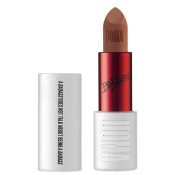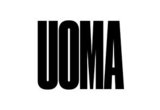As the brains behind a brand as groundbreaking as UOMA Beauty, it’s no wonder founder and CEO Sharon Chuter has a pretty fascinating backstory. The former LVMH exec admits that she fell into the beauty industry (as a teenager!) after asking Revlon if she could be their distributor in Nigeria, her home country. Fast-forward a few years, and Chuter is making waves in the beauty industry with her inclusive cosmetics brand and #PullUpForChange, a grassroots campaign which challenges beauty brands to disclose the number of Black employees on their payroll. Ahead, we chat with Chuter to learn more about the story behind the brand she calls “a beautiful tribe where all are welcome.”

How did you get your start in the beauty industry?
It was actually a fluke. I was supposed to go be an engineer. It’s a long story. I was supposed to be a pilot. Then I decided I was going to go fix planes, because I’m from Nigeria and there are only four professions in Nigeria: doctor, lawyer, engineer, or disappointment. I had to pick one of the three that wasn’t a disappointment, which was an engineer. Then right before I started uni, I decided to be an accountant. But then I left and dropped out and went to go chase music. And then I realized that music does not pay the bills—until you’re Beyoncé, you got to get a second job. That’s how I stumbled into beauty, because I had to do something. I had this crazy moment where I was like, “Why aren’t any major beauty brands in Nigeria?”
So what did you do after you realized that?
I reached out to all the major brands in the world, asking to be their distributor in Nigeria. Revlon responded, and the rest is history. I ended up bringing Revlon to Nigeria at a ripe, young age. I was still a teenager at the time, when I brought it into the country, and they had tried to come in for 15 years. In that moment, I realized two things: I had passion for makeup, and I had a thing for business. But I didn’t want to just jump in… I knew I was really young, and I had a lot to learn, so I chose to go into corporate. That was why the beauty industry was selected, because I realized that it resolved the conflict I always had: I was very academic, very mathematical, but at the same time, I was extremely creative. Beauty was literally a beautiful avenue to do both—to be both creative but also to be a business person. That’s how I went into beauty; I started on the sales floor and worked my way up to the C-suite before I left to go set up my own business.

What inspired you to start UOMA Beauty?
For me, it was that the beauty industry is very exclusive. It’s a very monolithic industry. You start realizing the impact of the things you’re doing to the community and the world at large, when you have a very narrow definition of what beauty means. For me as a Black woman, you learn from a very young age that everything about you is wrong. Your skin color, your body features. I couldn’t work in an industry and see that I was enabling that. It became culpability by complacency. I was part of the problem. For me, that’s why I had to go out and set up my own brand. I wanted to create a community where everybody can feel included and welcome.
 Inclusivity has been important to UOMA Beauty from the very beginning. Why is that?
Inclusivity has been important to UOMA Beauty from the very beginning. Why is that?
On some level, most people have experienced being left out. I wanted to create a whole new tribe and a whole new community of the weirdos, the rejects, anybody who’s ever felt left out. Whether it’s because of the color of your skin or who you love, the size of your body, your gender, come one and come all, because guess what? They call us a minority, but together we are actually the majority of the world. I wanted to create a movement. I wanted to create a community that was rooted in positivity, that was rooted in change. We’re changemakers. We’re in the business of driving change, whether that’s through beauty or in society at large. And really, that was my “why” for setting up my own business: to create a whole new community to drive a more outspokenly inclusive culture around beauty in particular.
UOMA Beauty is an outspokenly anti-racist brand. How has that affected your journey as a founder?
My brand is not a place to escape from what’s going on in the world. It’s a place to immerse yourself in what’s going on in the world. Making the world a better place is not a part-time job, it’s a full-time commitment. Making the world a better place is the rent we pay for the life we’re given. If you’re going to come into this world and pay no rent and just coast through your entire life, then you should rethink yourself. As such, every brand should stand for something. If you don’t stand for something, then you really need to rethink your place in 2021!
I think a lot of brands are understanding that now. When we came out, people were like, “Oh, I don’t want to talk about this.” And now that this seismic change is happening, people are now trying to catch up. Yes, we lost a lot of business. Yes, people felt uncomfortable coming to our counter. But when I came to set up this brand, I took a vow of poverty, essentially. I was ready to sleep in my car. And that’s what I tell people. I’m like, “If you see every decision I make, it doesn’t look like decisions that are conducive to a successful brand.” But the irony is, it has become successful. I hope in doing what I’m doing, it inspires other people that you can walk this line between doing what’s morally right and being an ethical disruptor, and it’s not mutually exclusive to running a profitable business.
Was that in part why you started #PullUpForChange?
PullUpForChange was supposed be brand suicide! How do you challenge the same industry to which you’re supposed to fit in, and you’re not even a major player? You’re a minor player who’s still looking for people to accept you, and then you come out and challenge them and say, “Hey, be more inclusive.” We got blacklisted. But yeah, that doesn’t deter me. The work that needs to be done is more important than Sharon’s bank account.

You’re closely involved in product development. How do you get inspired to create new products?
I get an inspiration, I get a thought, I get an idea, and then I backfill the product. For instance, look at my BadAss Icon Matte Lipstick range. I wanted to celebrate badass women. I wanted women to feel fierce, and then it backtracks from there. What product makes sense to carry that label? Okay, a lipstick, amazing. And then I start developing formulas. And a lot of times, as well, I do things concurrently—I find interesting formulas or I have an idea of a gap in the market from a formula perspective and start developing it, but not really knowing what I want to do with it yet. Then I get an inspiration and then go, “Oh my God! You know what? This is perfect here.”

What’s an example of that?
An example is Black Magic Lipstick. I had encountered that and gone, “Oh, this is crazy. Let’s develop this.” And then on the other hand, I was like, “Oh my God, I want to tell the story of African mythology and talk about these goddesses. We know about Greek mythology, we know about Roman, but we don’t know anything about African mythology.” I knew I wanted to do something there, and so that was another example of, "Oh my God, that’s perfect. This lipstick in itself is so magical.”
How does your commitment to inclusivity affect your approach to product development?
Anybody who has worked with me, they all know that if it doesn’t work on all skin tones, it won’t exist. I am one of the only people in this industry developing products who will take six to 12 models into a lab at any given point in time. It doesn’t happen. I’m telling you that for most dark shades, you’re lucky if it gets swatched on human skin. When I create products, I’m one of the rarities in the industry who does that. With my foundation (Say What?! Weightless Soft Matte Hydrating Foundation), I went outside the lab and tested it on over 300 women. I shade-matched them all!
What’s on the horizon for UOMA Beauty?
We’re taking each day as it comes. We’re doing a lot of exciting things. We’re really taking inclusivity a whole new leap further. For us, from a product perspective, we’ll continue to surprise and delight and include more and more people. From a retailer perspective, that’s what we’re doing, really removing ourselves from this industry norm, or going “What’s the category?” We don’t care about categories. We care about lifestyle. We care about people. People can expect more advocacy from us. We will continue to talk about the things that matter to us, and people have to get used to the fact that we are a safe space. All are welcome. Everybody’s welcome in our tribe—everybody’s included in some way.
Shop the entire UOMA Beauty collection.
All images courtesy of UOMA Beauty
Featured Products
You Might Also Like
-

Candles & Home Scents
Nomad Noé Candles Highlight Forgotten Figures of History
- 1
-
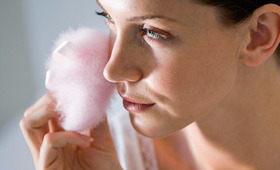
Counter Confidential
Counter Confidential: My BFF, The Powder Puff
- 551
-
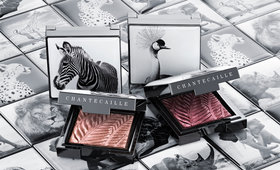
Behind the Brand
Behind the Brand: Sylvie Chantecaille of Luxury Botanical Beauty Brand, Chantecaille
- 1
-
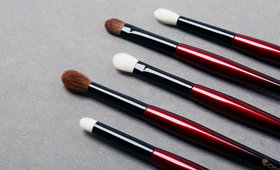
Stories
All the Details on Sonia G.’s Newest Brush Set
- 4
-
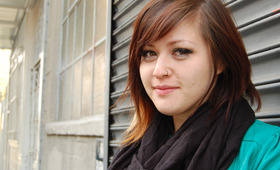
Social Experiments
Social Experiment: The Morning After
- 91
-
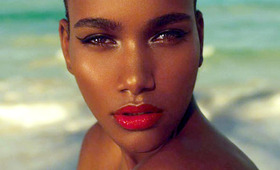
Stories
Brown Girl Beauty Myths: "Never Caught Dead In Red"
- 345





